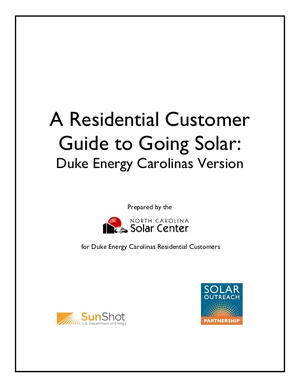
A major goal of the SunShot Solar Outreach Partnership and the North Carolina Solar Center is to reduce the non-hardware “soft” costs of solar PV by educating homeowners and businesses customers about the significant monthly savings that solar PV can provide them.
Over the past several years, North Carolina has emerged as one of the nationwide leaders in solar energy development. In 2013, it emerged as the 2nd largest market for solar PV in the United States. However, most of its solar success has come from installing large, utility-scale ground-mounted solar arrays in rural areas, not from rooftop solar installed on-site by North Carolina homeowners and businesses.
As part of a SolarOPs-funded technical assistance and outreach effort to help our fellow North Carolinians cut their energy costs with innovative technology, the North Carolina Solar Center has released two Residential Customer’s Guides to Going Solar for residential customers of both Duke Energy Carolinas (residents of Charlotte, NC, Durham, NC and the cities of the Piedmont Triad) and Duke Energy Progress (residents of Raleigh, NC, Wilmington, NC and Asheville, NC).
These guides provide a wealth of useful information for homeowners interested in investing in solar PV for their home in these cities, including:
- How large a solar PV system has to be to offset portions of their utility bill;
- How solar PV helps them save money (through on-site use, as well as selling energy back to Duke Energy through a utility billing practice known as net energy metering);
- The key federal, state and local policies, incentives and financing options available for reducing the overall cost of going solar in North Carolina and the upfront cost of purchasing the system, including the 35% North Carolina state tax credit expiring at the end of 2015; and
- The advantages, disadvantages, and expected future monthly savings and 25-year inflation-adjusted returns on investment associated with various utility rate options for solar PV customers.
Overall, the guides show that, with an average-sized residential system, customers of Duke Energy in North Carolina can save up to an average of $55/ month on their utility bill with a system that can costas little as $4,000 after incentives. These guides show that solar energy has much to offer North Carolina homeowners, and it is more affordable than ever.
If you are interested in having a custom-designed “guide to going solar” like these created for customers in your region, or in any other SunShot Solar Outreach Partnership technical assistance services, please do not hesitate to email solar-usa@iclei.org and declare your interest.
